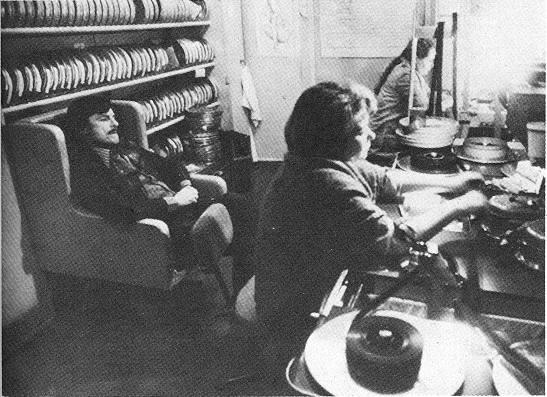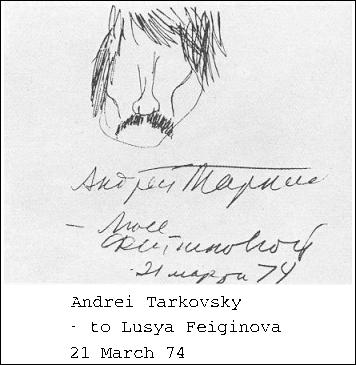
Lyudmila Feiginova on...StalkerThe first piece below is taken from Maya Turovskaya's book 7½, ili filmy Andreia Tarkovskovo, "Iskusstvo", Moscow 1991, ISBN 5-210-00279-9. The second portion is from Lyudmila Feiginova: Pyat' filmov s Tarkovskim, in: O Tarkovskom, "Progress", Moscow 1989, ISBN 5-01-002285-0.
In Ivan's Childhood there was this one musical phrase — it went thorugh all his films, in many variations of course, but it held them together. It can be heard in Rublov at the moment the three of them stand under the oak tree — it's the nostalgic longing for childhood, holiness, for something radiant... It can be heard in Stalker too. It's at the same time like a motif of life, light, a call to follow somewhere... [...] Lusya, has anything survived from the first version of Stalker? And what has really happened to the emulsion? From the 5,000 metres filmed, only individual film frames survived, the ones I had cut out from every episode and subsequently sent to Andrei Arsenevich. We wanted to store the negative at Bielyie Stolby but some idiot there — I forget his name — said Filmofond was not a junkyard. It was all very simple. At the Goskino someone who didn't even know me — when he saw how upset I was — told me: "Well, what did you expect, this is an outdated emulsion, it doesn't satisfy the norms". And then look how they developed it. After finishing a portion of the material Andrei Arsenevich would stop the shooting and rush out to argue and they would say: "Everything will be all right". It is complete nonsense to say that Andrei Arsenevich refused the material because he wanted a second version. [...] It was only the gigantic strength of Tarkovsky's will; he managed to go back to the original idea for the film and to give birth to a new Stalker. Tarkovsky was rewriting it with his own blood! No other director would ever do such a thing. At the same time Andrei Arsenevich was very economical and watched every kopeck. They reshot entire film for the money that was set aside for Part Two — this was simply heroism. You know, Andrei Arsenevich was excellent at getting things done, other directors could learn a lot from him. We edited and submitted all our films before the deadlines. Although no film would initially be approved and everything was done to make us finish late — that's another story — but we submitted all our films a month ahead of schedule.
While working on Stalker we went through similar arguments [as during the editing of The Mirror]. Alissa Freindlikh, whom Andrei considered one of the best among Soviet actresses, played Stalker's wife and she delivered her monologue in the café after the heroes' return from the Zone. A very important monologue, it expressed one of the film's central ideas. One might even say that the whole picture was made around this monologue. Because of that I suggested to Andrei to insert it at the end so that it would be directed not towards the three characters in the film but to all viewers. Andrei objected: "Can't you see the scene was shot in a different interior? The wall of the café will be plainly visible." "I don't give a damn about the wall, I'm watching the actress! Let me insert the scene at the end and if you don't like it I'll put it back where it was. I'll be doing extra work!" And I did that. Tarkovsky watched it once, twice, three times — and he agreed. [...]
I keep materials for the first variant of Stalker shot by the amazing cameraman G. Rerberg. This is brilliant material, both in its directing and in its photographic mastery. During the shooting of Stalker a disaster struck. The entire filmed material turned up defective. The problem started with the Committee for cinematography acquiring the precious Kodak film through one of its divisions abroad. Portions of this emulsion were given to different film production groups. And when they got a defect, the groups simply reshot their damaged materials without much fuss. But Stalker was shot on this film in its entirety. The defect was not immediately obvious. They tried to determine whose fault it was. Some said that Rerberg intentionally, at the director's insistence, had used filtration to have the image acquire an "aquarium" look. Tarkovsky had a foreboding something funny was happening to the emulsion. He kept asking the lab to check every portion of the shot material thoroughly, he flew from Tallinn to Moscow telling the lab personnel that something was not right. Still, they weren't rejecting any material, the filming continued and all the nature shots were finished. The money alotted for them was spent. In the end the film defect was confirmed and the director and the crew found themselves in a critical position. Tarkovsky found the only possible way out — make it a two-part film, get the money for the second part and shoot it all over again. He found enough strength in himself to redo everything. But one cannot bathe in the same river twice. It proved as impossible to revive that first Stalker as it would be impossible to relive the first love. Andrei took the shooting of the second variant as a tragedy. He had already experienced this picture once and now he was supposed to carry out the impossible. I remember that state of depression and confusion Andrei had been in when the Goskino officials refused to accept The Mirror and continually demanded changes. Something similar was happening to him on Stalker. The emulsion disaster left Andrei shaken, it literally threw him to the ground. Towards the end of his stay in Tallinn he asked me to come for three days, he was stressed out and simply needed some sympathy. Shortly after that the work was suspended and some time later Andrei had a microinfarction. But fate spared him. He reshot Stalker and made two more films abroad. [...]

I frequently reminisce how during the breaks between films he
would come to the editing room and sit in his chair behind my back,
simply to keep silent. Even without words we understood each other. |

 He will remain forever young to me. Now I look at his last photographs,
I saw films about him shot abroad... He changed of course, but for me
he still remains as young as he was the day he first arrived at the studio.
At home I keep his drawings, single frames from his films, film fragments.
An unused film reel can simply disappear from the studio just as it happened with
the Vysotsky material which didn't go into M. Shvejtser's
picture Escape of Mr. McKinley.
He will remain forever young to me. Now I look at his last photographs,
I saw films about him shot abroad... He changed of course, but for me
he still remains as young as he was the day he first arrived at the studio.
At home I keep his drawings, single frames from his films, film fragments.
An unused film reel can simply disappear from the studio just as it happened with
the Vysotsky material which didn't go into M. Shvejtser's
picture Escape of Mr. McKinley.
